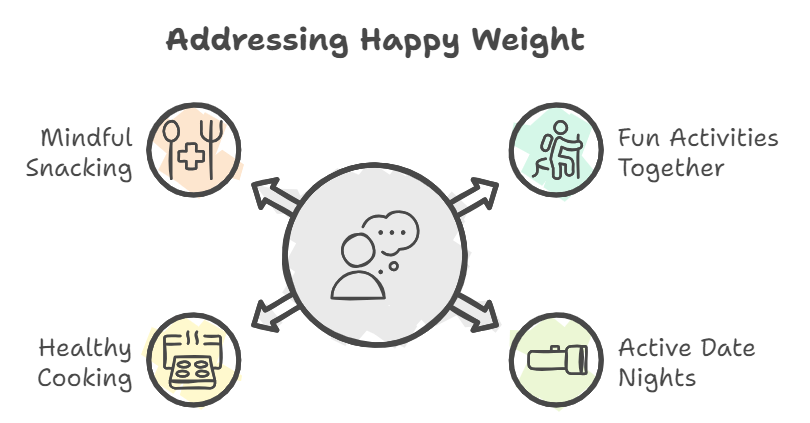You’ve found the perfect partner and you’re happier than you’ve ever been – congratulations. But as you settle into your relationship, you might notice the number on the scale creeping up – something that’s called happy weight.
Don’t worry; you’re not alone. The phenomenon of relationship weight gain, often dubbed “happy weight,” is incredibly common. Romantic partners often experience weight gain, but how much of it is due to simply being happy?
So, what causes this so-called “happy weight?” A 2012 study1 published in the journal Obesity found that moving from singlehood or dating to living with a partner is associated with an increased likelihood of obesity.
But why? Several factors contribute to gaining happy weight when we’re in a relationship.
Why Do People Gain Happy Weight?
First, let’s face it – new relationships often revolve around food-centric dates. Think candlelit dinners, trying out trendy restaurants, or cozy nights in with takeout and movies.
When people dine out, especially in the honeymoon phase, they may indulge in richer meals and larger portions than they would at home.
These extra calories can quickly add up. It’s no surprise that individuals may experience weight gain during the early stages of a romantic partnership.
Settling Into Shared Routines and “Behavioral Convergence”
As your relationship develops, you create shared routines. You might find yourself mirroring your partner’s eating habits, a phenomenon researchers call behavioral convergence2.
If your significant other loves late-night snacks, weekend brunches, or enjoys a more relaxed approach to fitness, you may unconsciously adopt some of these habits too.
This can lead to changes in your eating plan and activity levels, potentially impacting your overall health. This behavioral convergence might also explain why happy couples tend to gain weight together.
Shifting Priorities
Early in a relationship, it’s natural to dedicate a lot of time to your new partner. Date nights take priority over gym sessions, cooking elaborate meals together replaces solo meal prep, and maybe those late-night chats mean less sleep (which can also impact weight gain3).
Remember, lifestyle changes are often the most significant contributors to happy weight. When you spend time with someone you care about, it’s easy to let healthy habits slide. Over time, these small changes can have a significant impact on your weight.
Relaxed Approach to Appearance
Remember those pre-date primping sessions and meticulously planned outfits? It’s only natural that our focus on appearance might soften when we feel secure and loved in a relationship.
This can sometimes lead to a more relaxed approach to maintaining a certain body image.
A study in the journal Social Science and Medicine suggested that married people are less focused on their weight and more likely to consume what they perceive as healthy foods compared to their single counterparts4.
They found that those in happy, long-term relationships often prioritize their relationship over their physical appearance.
The “Mating Market”
This might sound a tad cynical, but some psychologists posit that weight management before a committed relationship might, consciously or not, be a way to stay competitive in the “mating market.”
Once that commitment is established, however, the pressure to maintain a certain weight may decrease.
However, research has also highlighted that those early years of marriage can bring happy weight gain.
Interestingly, research co-authored by Novak5 determined that, among those married for more than four years, content couples were twice as likely to gain weight as less-content ones.
This suggests that relationship satisfaction, rather than just the security of a relationship, might play a role.
Increased Chance of Shared Meals
Living together usually translates to more shared meals, which can sometimes mean eating more, even if unintentionally.
It’s easy to overestimate portion sizes or graze absentmindedly during movie marathons on the couch. You might also be influenced by your partner’s eating habits.
For example, if your partner is someone who eats large portions, you may find yourself eating more than usual to keep up.
These shared meals can be a wonderful way to bond, but it’s important to be mindful of portion sizes and eating habits.
Major Life Events
Long-term relationships often include big life changes, such as moving in together, getting married, and having kids—all of which can influence weight gain.
It’s easy to get caught up in celebrations, indulge a little more frequently, and move a little less.
These milestones often come with increased responsibility and potential stress, which can impact eating habits.
Additionally, hormonal changes associated with pregnancy and childbirth can also contribute to weight gain. It’s important to acknowledge these life changes and adjust your healthy habits accordingly.
Remember, a healthy lifestyle is about finding balance and making sustainable choices that support your well-being at every stage of life.
As we navigate these different phases of life, it’s easy to feel overwhelmed by all the changes. I completely get it—whether it’s juggling new responsibilities or adapting to the physical transformations that come with things like pregnancy or stress, keeping a healthy balance can seem tricky.
Recently, while looking for some guidance online, I stumbled upon something that’s really helped me stay on track. It’s not a magic fix, but it’s been great for keeping things manageable. If you’re curious, here’s the link to check GetThin USA out. It’s worth taking a look, especially if you’re looking for a bit of extra support to stay healthy.
So, is “Happy Weight” Truly Happy?
The term “happy weight” may sound positive, but it’s essential to remember that any excess weight gain can increase the risk of various health concerns, including heart disease, diabetes, and certain cancers.
Gaining weight because you’re truly happy and content with a partner is wonderful. However, being aware of unhealthy eating patterns, a more sedentary lifestyle, or feeling pressured to conform to a partner’s preferences is crucial.
This self-awareness will help determine if additional steps need to be taken.
If you’re concerned about weight gain, talk to your doctor or a registered dietitian for personalized advice. Remember, it’s possible to maintain a healthy weight and a happy relationship. If you’re looking for effective ways to manage your weight and burn calories without overhauling your lifestyle, check out these practical tips.
Is Your Relationship Making You Fat?
When love means sharing dessert every night or swapping gym sessions for movie marathons, your relationship could be contributing to happy weight.
While enjoying treats and relaxing together is perfectly fine in moderation, it’s crucial to maintain a balance.
“When couples align their health goals, they create a supportive environment that makes sustainable lifestyle changes more achievable.”
Dr. Mark Hyman
But, if you and your partner bond over late-night pizza deliveries and indulgent weekend brunches, chances are your joint habits could be tipping the scales.
If you notice these patterns becoming the norm rather than occasional indulgences, it might be time to reassess your lifestyle choices together.
Addressing “Happy Weight” in Your Relationship
The most important aspect of addressing potential happy weight is communication.
Have an open and honest conversation with your partner about your concerns. Focus on expressing your feelings and desires in a supportive and non-judgmental way.
Frame the conversation around shared goals for well-being, focusing on supporting each other to make healthy choices – together.

Remember, you’re a team, and working together can make the process more enjoyable and sustainable.
- Find Fun Ways to Get Moving Together: Replace those takeout-and-movie nights with activities like hiking, trying a new dance class, or even just going for walks together. Make fitness a shared priority, creating fun experiences you can both enjoy.
- Rethink Your Date Nights: Who says a date night has to revolve around food? Opt for activities that involve movement, exploration, or learning something new. Go for a bike ride, try rock climbing, check out a local museum, or even visit an amusement park for a more active date.
- Become Culinary Partners-in-Health: Make cooking healthy and delicious meals at home a joint endeavor. Experiment with new recipes, explore healthy substitutions, and challenge yourselves to try a plant-based meal a few times a week.
- Mindful Snacking Makeover: Restock your pantry with healthier snacking alternatives, so you’re prepared when those late-night cravings strike. Opt for fruits, vegetables with hummus, a handful of nuts, or plain yogurt with honey instead of chips or ice cream.
Remember, a few extra pounds don’t mean your relationship is unhealthy. Love, support, and a shared commitment to each other’s well-being are what matter.
However, staying mindful of your health while savoring those moments of happy togetherness will help create a fulfilling and healthy journey for both of you.
Conclusion
Achieving a balance between your happiness, relationship, and health is essential for long-term success. By starting with small, achievable steps like shared routines, goal-setting, and adapting when needed, you can create a sustainable lifestyle that supports both your well-being and your relationship.
Join the conversation by connecting with others on our community platform, where couples share their experiences, challenges, and tips for staying healthy together.
If you’re looking for more personalized advice, consider signing up for a consultation with one of our health coaches, who can help you and your partner create a sustainable, healthy lifestyle based on your unique needs and goals.
Take the first step today and begin your journey towards a healthier, happier you!
Small Step, Big Impact
To maintain a healthy weight together, couples can schedule regular physical activities they both enjoy and plan balanced meals to prepare at home.
Listen to this article
This is an AI generated Podcast version of the article.



